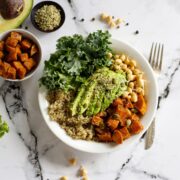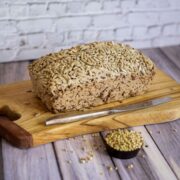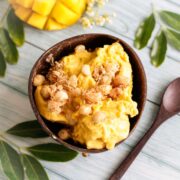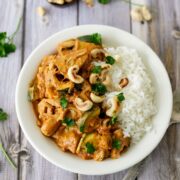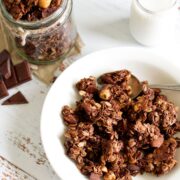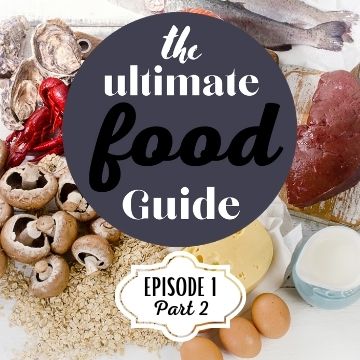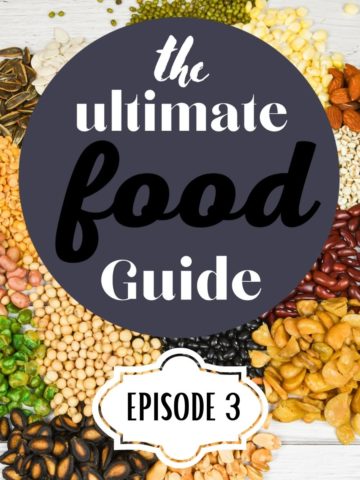In episode 4 of the Ultimate Food Guide, we talk about another important nutrient group: dietary fats and fatty acids. As you probably know, our body produces it from taking in excess calories. Luckily, we know now that fats don’t (necessarily) make us fat!
For so many years, we tried to avoid it, reduce it to a minimum. I was one of those people, I admit it. I was almost obsessed with eating low-fat or even fat-free! Crazy! Because actually, they are so important! In general, our body needs dietary fats for energy, to absorb fat-soluble vitamins and for our heart and brain.
What we need to understand is that there are healthy and unhealthy fats. Fortunately, on a plant-based diet, we don’t really have to worry about it all too much since the unhealthy fats are mostly animal fats – but not all of them. So, there are a few things you should know about.
The types of dietary fats
As I just mentioned, there are healthy (“good”) and unhealthy (“bad”) fats. So what does this mean in particular? First of all, you need to know that science and research are constantly evolving and kind of change their opinions regularly. What has been considered “healthy” just last year, is now bad for you—and that might change again next year. As always, you choose what you think is true or false, or if you simply wanna go with whatever scientists say.
In this article, I divide fats into “the good ones” (as in fats you can eat) and “the bad ones” (as in fats you should eat less of, or even avoid). This is not my idea, it’s the general (scientific) opinion, by the way ;). But to me, it sounds very plausible.
The bad ones aka saturated fats aka unhealthy dietary fats
Why are they unhealthy? The bad fats, such as saturated and trans fats, possibly lead strokes, heart disease, cardiovascular diseases and diabetes. Mainly, it’s about the cholesterol levels.
Here as well, we differentiate between good (HDL—high-density lipoproteins) and bad (LDL—low-density lipoproteins) cholesterol. As you might have guessed, bad fats can raise the amount of LDL in your blood and contribute to clogging your arteries or negatively impact your heart health.
Saturated fats
Animal fats, meat and dairy contain saturated fatty acids and should be reduced to a minimum—which isn’t a problem when being on a plant-based diet, right? Be careful though! Coconut and palm oil also belong to this group! Studies however, have not found out the clear effect that those tropical oils have on our health. Some say they are healthy and OK to consume, whereas others claim they are just as unhealthy as butter.
I reckon, go with your gut feeling! If you feel like, you can eat coconut oil without any problem, go for it. If you think, it is too rich, leave it out or eat less! I love using coconut oil for baking as it’s often the ideal, dairy-free butter replacement! But I don’t like using a lot of it or using it very often (meaning daily), because I actually find it’s quite filling (sometimes in a bad way).
By the way, you can tell that an oil or fat is saturated, when they remain solid at room temperature (just like butter, lard and coconut oil).
Trans fats
Trans fats occur naturally in some animal products, but it’s rather the artificially produced trans fats we have to be aware of, in fact, we have to avoid! They are even considered dangerous as they not only raise the bad (LDL) cholesterol level, they also lower the good (HDL) one at the same time! This can have severe consequences for our health! Most countries are starting to prohibit them so for now, they are still around!
And if you think, you’re safe as a vegan, you’re unfortunately wrong. Many processed foods, especially baked goods, contain artificial trans fats! You can check the food labels to see how much they contain. However, if they indicate 0, it doesn’t mean they have none in it. You would also need to check the ingredients list for hydrogenated or partially hydrogenated oils. When they do, this means, yes, this product does have trans fats in them!
The good ones aka unsaturated fats aka healthy dietary fats
Why are they healthy (or healthier)? Unsaturated as well as saturated fats are good for us when it comes to vitamin absorption alone. For our body, it doesn’t matter which one of them we’re eating, as long as it’s fat! Why bother then? Well, unsaturated fats have the ability to raise the good cholesterol (HDL) levels in our blood—opposing to saturated fats which increase the bad cholesterol (LDL) levels.
So, we want to have as many “good” fats in our diet as we can and reduce the bad ones as much as we can. Easy, right?
Unsaturated Fats
We again divide unsaturated fatty acids in two: poly- and monounsaturated. The name refers to their molecular structure, but I won’t explain what it exactly means because it goes further into chemistry and biology, and I’m not here to bore you with this.
Monounsaturated: remain liquid at room temperature but may solidify when chilled. Foods that contain monounsaturated fats: avocado (and its oil), nuts (and their oils), vegetable oils (olive, canola, safflower, sunflower) and sesame oil.
Polyunsaturated: Foods that contain polyunsaturated fats: nuts, seeds, fish, seed oils.
And because it’s so much fun, we again divide this group in two: omega-3 and omega-6 fatty acids.
Omega-3 Fatty Acids
Our body primarily needs omega-3 fatty acids for our cells to form the structures of their membrane. Also, they are good for our brain, nervous system, help prevent heart disease, stroke, cancer and depression, balance our mood and promote a healthy pregnancy.
ALA (Alpha-Linolenic Acid), EPA (EicosaPentaenoic Acid), and DHA (DocosaHexaenoic Acid) are the 3 different types of omega-3 and this is very important to know! Because not all the omega-3 fatty acids are the same!
You know, when we say, walnuts, or chia and flax seeds contain high levels of omega-3, then that’s actually only in ALA. Our body can’t produce it itself, thus gets it from the foods we eat. That means it’s an essential nutrient and very important for our health and well-being. Apparently though, EPA and DHA do a better job at this and are therefore the preferred omega-3 type. Our liver is able to convert ALA to EPA and later to DHA, but it’s only doing that at a low rate.
Some articles I read say that when there is omega-6 around, our liver produces even less (we’ll get to omega-6 in a minute).
What foods contain ALA?
Although only 6-15% of ALA is transformed in our liver, it’s still more than nothing and therefore we should get enough in our diet as well! As I already mentioned before, walnuts, chia and flax seeds are an excellent omega-3 source. Also beans, canola and soybean oil, and some vegetables like spinach, kale and Brussels sprouts.
What foods contain EPA and DHA?
Unfortunately, EPA and DHA are only in foods coming from the sea—fish and seafood are the preferred sources. But, if the fish have it, so do the plants! The only natural and vegan source for these 2 types of omega-3 are algae (e.g. seaweed). Vegetarians may obtain DHA from eggs as well.
Just be careful with eating too much algae as it also contains high levels of iodine (read about it in episode 2 – Minerals)—it may interfere with your hormones (thyroid gland).
Another option would be to take (vegan) supplements which are derived from marine algae and only provide EPA and DHA, not iodine.
Omega-6 fatty acids
This is a bit of a tricky one. Whilst omega-6 belongs to the polyunsaturated, thus good, fatty acids, it’s said that it causes inflammation, blood clotting and constriction of blood vessels.
This is why many articles talk about the omega-3 and omega-6 ratio—eating less of the latter, or a 1:1 ratio. In our Western diet, we tend to have a 1:16 ratio which is way too much omega-6.
I also found an article where they say omega-6 isn’t as bad as we think. A study found out that it did not increase inflammation but instead it lowered the risk of heart disease. So, they advise not to cut down on the actually healthy omega-6, but eat more omega-3 fatty acids.
What foods contain omega-6? Nuts, seeds, soybeans, corn, safflower and sunflower oil, as well as animal products.
What should we do about the omega-3 and omega-6 fatty acids?
I reckon, a 1:1 ratio isn’t wrong and you could try to stick with it. Honestly, I don't really know how you could do that. It probably involves some research, or it might be like counting calories. If you concentrate on eating a lot of food high in omega-3 fatty acids, you’re fine I guess. That's how I do it.
Just a quick little note, be careful not to eat too many walnuts (or any nuts high in omega-3). They're high in phytic acids as well which interfere with the absorption of some minerals.
Also, I’m not really sure, whether we’d really need to push the EPA and DHA intake with supplements or eating more algae.
Of course, they are more beneficial for our body however, as we can also convert ALA (even if it’s at a low rate), I don’t think we can get a deficiency. Taking supplements is probably rather a plus for our health, not a necessity. Though this might depend on your body, your health (also mental health), and your diet, too!!
Please, do your own research here and decide what you want to do.
I’m too lazy to read, but don’t wanna miss out – Quick Facts
- Dietary fats are important for our body. It needs them for several functions, vitamin absorption and energy.
- There are “good” and “bad” fats.
- Bad fats are trans fats—which should be avoided—and saturated fats (mostly animal fats, but also coconut and palm oil)—which are OK in very moderate amounts.
- Replace these bad dietary fats with the good fats which are unsaturated. Unsaturated fats are in many nuts, seeds, and vegetable oils.
- They are divided into 2 groups: mono- and polyunsaturated fats.
- Polyunsaturated fatty acids (PUFA’s) are again divided into 2 groups: omega-3 and omega-6 fatty acids.
- There are 3 types of omega-3: ALA (in many plant-based foods), EPA and DHA (in fish, seafood and algae only!).
- Our body only transforms 6-15% of ALA to EPA and DHA of which we need more. Algae or supplements are the only vegan source for EPA and DHA.
- Many people say omega-6 is, although it belongs to the PUFA’s, isn’t good for our heart and may cause inflammation.
- A study however showed the opposite to be true. According to it, it’s beneficial for our heart.
Resources
- https://www.mayoclinic.org/healthy-lifestyle/nutrition-and-healthy-eating/in-depth/fat/art-20045550
- https://www.helpguide.org/articles/healthy-eating/choosing-healthy-fats.htm
- https://medlineplus.gov/ency/patientinstructions/000785.htm
- https://www.health.harvard.edu/newsletter_article/no-need-to-avoid-healthy-omega-6-fats
- https://shop.ora.organic/blogs/news/ala-epa-dha-omega-3-decoded

